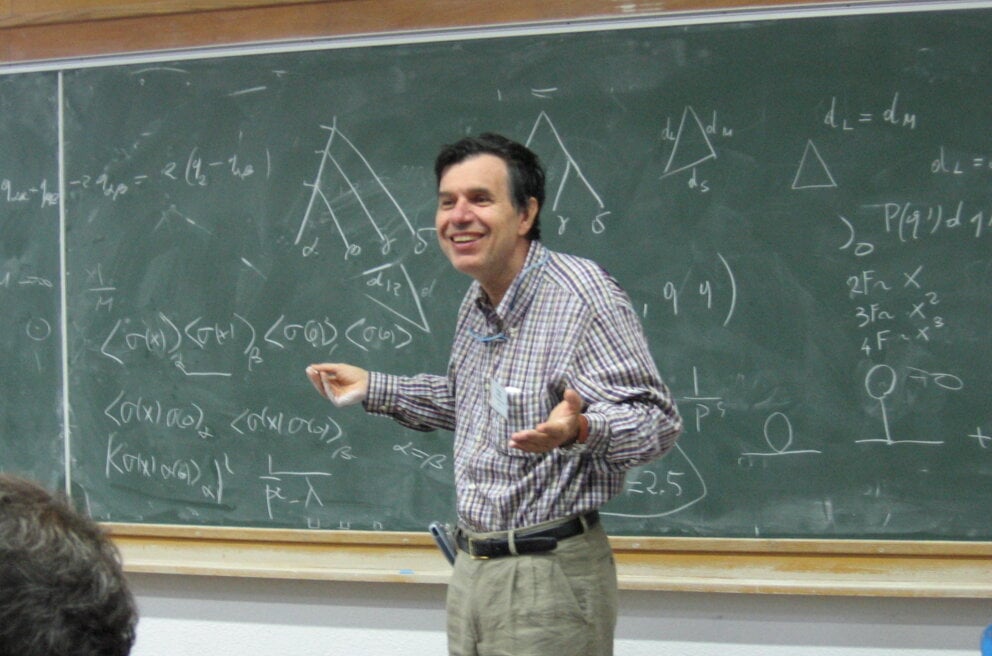Giorgio Parisi
Interview
Interview, February 2022

Giorgio Parisi teaching
Courtesy Giorgio Parisi
“If you are confident that you can do something you will do it”
Nobelprize.org spoke to Giorgio Parisi on 18 February 2022. Parisi told us about his love of reading, dancing and solving the puzzle that is our world.
Telephone interview, October 2021
“There are very, very simple problems that are very hard to understand”
Telephone interview with Giorgio Parisi following the announcement of the 2021 Nobel Prize in Physics on 5 October 2021. The interviewer is Adam Smith, Chief Scientific Officer of Nobel Prize Outreach.
In this short conversation, recorded shortly after his Nobel Prize in Physics was announced, Giorgio Parisi reflects on the value of asking basic questions. But what sort of questions does he address? “My mentor, Nicola Cabibbo,” he says, “was usually saying that we should work on a problem only if work on that problem is fun!” He then talks about his hopes for science funding and the need to communicate. “It’s important that the people who in the end pay the bill for science have some understanding of what science is going on.”
Interview transcript
Giorgio Parisi: Hello?
Adam Smith: Hello, am I speaking with Professor Parisi?
GP: Yes, I’m Giorgio Parisi.
AS: Hello, my name is Adam Smith. I’m calling from the website of the Nobel Prize. Many congratulations on the award of the Nobel Prize.
GP: Thank you, you are very kind.
AS: Of course there has been speculation that you might be in the running for a Nobel Prize for some years. How does it feel to be awarded the Prize?
GP: Well, let’s say that I’m very happy for, for … also because it’s a recognition of the importance of the field on which I’ve been working for so many time, and that I have developed, because I was one of the founders of the … of the study of complex systems in physics. So I am very happy that all this lifelong work has been recognised not only by other prizes but also by the Nobel Prize.
AS: Yes indeed. You work on such a variety of problems, from quantum chromodynamics to the movement of flocks of birds. What is it about a particular problem that attracts you?
GP: Well, my mentor Nicola Cabibbo was usually saying that we should work on a problem only if working on the problem is fun. So, I mean, fun is not very clear what it means, but it’s something that we find deeply interesting, and that we strongly believe that it is … I mean you won’t find fun in [unclear] because one gets a new idea of something unexpected and so on. So I tried to work on something that was interesting and which I believed that had some capacity to add something.
AS: Do you choose problems that are seemingly almost impossible? How hard should the problem be?
GP: Look, the problem may be relatively simple but maybe, I mean, not impossible but very hard … extremely hard to study, and we really don’t … we are not able for the moment to understand precisely. But I mean there are very, very simple problems that are very hard to understand.
AS: And this award really highlights the importance of the fundamental science behind understanding climate change.
GP: Yes, so that’s correct, because fundamental science is crucial. It’s crucial for understanding everything, and will not go too much towards, only in applied science, but it’s important that applied science and fundamental science go together. Because many times the application from fundamental science to applied science, applications that can be useful to humanity comes in some unexpected ways from your science.
AS: Do you think that in general people understand that, or does it need to be reinforced?
GP: I think that usually people do understand, but sometimes at the moment where a decision has been taken by the government, they’re sometimes … but some governments usually forget. I mean there are some countries like South Korea that spend a high percentage of money on fundamental science. Italy is very low level, but I hope and am confident that in the future this thing is going to change. But let’s see what happens.
AS: I suppose one thing that will change a little bit is your life for the next little while because the Nobel Prize brings a lot of attention and people call you all the time. I mean you had a lot of attention already, but this will just increase it. How do you feel about that, and the disruption?
GP: I think that … [laughs]. Well, I hope that they’re not going to change too much my life. Of course it will take me a few days to answer to all the phone calls that I had today, but it is important to have the people that are going to pay the bills of science to have some understanding of what science is going on.
AS: Yes, indeed. Well thank you very much indeed. It’s such a pleasure to speak to you. Once again, many, many congratulations.
GP: Thank you.
AS: Bye, bye.
Did you find any typos in this text? We would appreciate your assistance in identifying any errors and to let us know. Thank you for taking the time to report the errors by sending us an e-mail.
Nobel Prizes and laureates
Six prizes were awarded for achievements that have conferred the greatest benefit to humankind. The 12 laureates' work and discoveries range from proteins' structures and machine learning to fighting for a world free of nuclear weapons.
See them all presented here.
